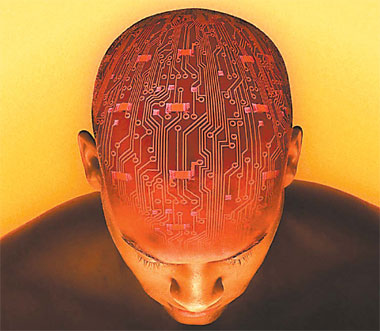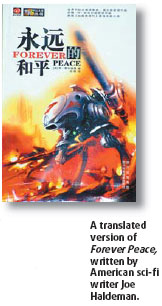Back to the future

"Anything you dream is fiction, and anything you accomplish is science. The whole history of mankind is nothing but science fiction."
The above quote, by Ray Bradbury, celebrated author of two of the most thought-provoking science fiction stories ever written - The Martian Chronicles and Fahrenheit 451 - boldly states the value of the branch of literature now respectfully referred to as SF.
And the works - one, a series of short stories on the colonization of Mars in an alternate universe and the other, a dystopian view of future society - encompass just two of the many issues explored in this vast genre, namely the exploration of alien worlds and how a scientific and technologically advanced future might affect society as we know it.

Such themes are just some of the many discussed during two of the most important science fiction events ever held in China - the 2007 Beijing Science Fiction Lectureship and the 2007 International SF & Fantasy Conference in Chengdu on August 21, and on August 24-27 respectively.
Both events precede the World Science Fiction Convention, which will open in Yokohama today - the first time it has ever been held in Asia.
These meetings highlight the increasing focus on SF from Asia and the great interest in how SF is developing in China and Chinese SF's growing impact.
"The Chengdu conference has three main themes - Science, Imagination and the Future," says Qin Li, editor of SF World, China's largest and most widely read SF magazine, and a co-sponsor of the event.
"China's economic growth, its scientific development and the world's focus on China has turned everyone's eyes on everything Chinese, including the field of science fiction.
But while rapid modernization has brought China into the industrial age, the space age and the age of the Internet at blinding speed, the economic, social and cultural background over which this has taken place are far more complex.
"Developing countries in the contemporary world are in a very complex situation after the formation of the global village," says Professor Wu Yan, author and deputy director of the Chinese Children's Literature Research Center at Beijing Normal University, hosts of the Beijing event.
"Contemporary China is a mix of industrial, pre-industrial and post-industrial elements. Two thirds of Chinese citizens are still farmers and most of their working ways are old fashioned. Things that happen on TV look like something that happens on another planet to these remote civilians.
"But in Shanghai, Beijing, Guangzhou and other big cities, post-modern lifestyles have emerged among white collar workers, intellectuals and teenagers.
"Writing SF in such a comprehensive context is a challenge to all SF writers."
Of the three, it is the industrial component that influences much of SF writing, he says.
"That is why (Chinese SF writer) Liu Cixin's works are welcomed today. He matches the Jules Verne style with today's industrial China."
While Liu's contemporaries Wang Jinkang, Han Song and Xing He's works cover social sciences or such 21st century issues as cloning technology, by and large, today's SF writers are too narrowly focused, says Professor Wang Fengzhen, a former research fellow at the Foreign Literature Studies Institute at the Chinese Academy of Social Sciences, a guest speaker in the Beijing conference.
Modern Chinese SF, which has grown in popularity since China's first manned space flight in 2003, "is not very complicated".
"Writers focus on environmental concerns - science, technology, ecology, China's development - but not many write about social problems and larger issues, which more developed SF does," Wang says.
While the country's openness to the rest of the world has brought an influx of foreign SF, most notably from the United States, the United Kingdom and Japan, much of this influence has spawned local imitations of space operas such as Star Wars, he says, rather than the groundbreaking ideas contained in the more complex works of SF icons such as Isaac Asimov, Robert A Heinlein and Arthur C Clarke, or recent torchbearers Roger MacBride Allen, Gregory Benford and David Brin.
What is lacking in Chinese SF is a willingness to take on such challenges and raise Chinese SF to its most potent, says Wang.
"Science fiction should be concerned about human beings, but at the moment, Chinese SF writers have their own form of censorship, and this affects their output. Such careful writing, limited to science and technology, will not release the imagination."
The Chinese word for SF, kehuan, meaning both imagination and prediction, is perhaps indicative of what a fully developed SF genre might look like if it were allowed to flourish.
"For many years, the United States was the frontier of rapid change," says acclaimed author David Brin, who is a guest of honor and speaker in Beijing and Yokohama. "Only now, America seems to be turning inward, and away from the future, even as other places and peoples are stepping forward."
In China, "there has always been a powerful tradition in literature of the fantastic. For example the butterfly dream of Chuang Tzu (Zhuang Zi) inspired several American SF stories that question the nature of reality, even as Western SF migrated east.
"It would seem that SF is just beginning its youthful and hopeful age (in China). The next new writer may be the one to set great things in motion."
From a relatively slow start, the development of Chinese SF could be a heroic story in itself. While the first-ever SF was penned in 1904, it wasn't until the 1950s that SF emerged as a genre, spurred on by leaders of the new Republic, who wanted to inspire the masses by championing science as the pathway to a better future.
But early pioneers were heavily influenced, not by the West, but by the former Soviet SF from the likes of Alexei Tolstoy, Ivan Yefremov and Alexander Kazantsev.
Kazantsev, a popular Soviet writer, wrote about the problems of the nuclear age and Tolstoy, about travel to Mars, while Yefremov's The Andromeda Nebula depicted socialist man reaching the stars and in turn, transforming Earth into a modern day Eden. Such writings were immensely popular at the time.
After being dismissed as bourgeois excess during the '60s and '70s, SF rose again in China in the late '70s when access to US and UK SF was allowed. It fell out of favor with the scientific community in the early '80s and remain so until the '90s with the advent of the Internet and the rise in China's economy and technological prowess.
Given its tumultuous history, it's perhaps unsurprising that today's SF writers are wary of extending themselves.
But the future looks promising. The SF World still has a monthly run of 320,000 copies which translates into nearly 3 million readers, making it the world's most successful SF publication (a top ranked US equivalent manages 100,000 copies a month).
And with today's proliferation of hundreds of SF dedicated websites, SF weblogs and a university-educated, Internet- and tech-savvy youth born after the mid-'80s with access to a wide variety of information platforms, SF writers who give full rein to their imaginations will likely find an eager generation ready and waiting for them.
Legendary Star Trek creator Gene Roddenberry once said, "Science fiction is a way of thinking, a way of logic that bypasses a lot of nonsense. It allows people to look directly at important subjects." In China, the golden age of SF may be just beginning.
(China Daily 08/30/2007 page18)














